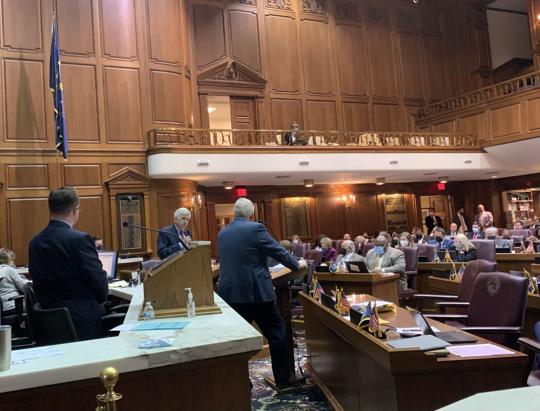***

EARLIER: The Indiana House debated House Bill 1001 for the first time Thursday after previously hearing hours of public testimony on vaccine mandates and the state emergency order.
Twenty-nine amendments were filed. Five were heard, and two passed.
The bill would regulate employer vaccine requirements in the workplace and make it easier for employees to get exemptions. It does not require businesses to mandate the vaccine. Health-care providers, however, would still be able to mandate the vaccine to their employees.
Under the bill, employees will be able to obtain exemptions for medical reasons with a doctor’s note, for religion reasons, or due to six months of natural immunity after having COVID-19. They also may opt for regular testing. If employees choose to be tested but fail to do so, then the employer may terminate the employee.
Rep. Dan Leonard, R-Huntington, offered an amendment on unemployment saying that if a Hoosier is fired due to a vaccine mandate, they qualify for unemployment and the employer’s unemployment insurance will be unaffected. The amendment passed unanimously.
“The way the bill is written, the only people that actually get penalized are the people that are good employers that very seldomly lay people off,” Leonard said. “This amendment takes that section out.”
Indiana’s unemployment rate is 3%, according to the U.S. Bureau of Labor Statistics, and is decreasing.
Rep. Chuck Goodrich, R-Noblesville, offered an amendment on prohibiting any contract or agreement from containing a provision requiring the vaccine. The amendment passed unanimously.
The bill’s author, Rep. Matt Lehman, R-Berne, said he just wants Hoosiers to be protected in the workplace.
While only half of Hoosiers are vaccinated, COVID-19 cases and hospitalizations have risen to levels similar to last year, before widespread vaccinations became available. According to the state’s COVID-19 dashboard, 81 of 92 counties are in the red for positivity rate, the most urgent category. Surrounding states are in similar situations with the exception of Illinois, which continues with masking mandates.
The bill now moves to a third reading and is expected to be voted on next week before heading to the Senate. — Alexa Shrake
***
EARLIER: House Bill 1001, a controversial bill requiring employers to allow exemptions from COVID-19 vaccine mandates, passed Thursday in a House committee 7-4.
The House Employment, Labor and Pensions Committee heard 14 hours of testimony over two days prior to Thursday’s meeting, which included two amendments to the legislation and a committee vote. Rep. Matt Lehman, R-Berne, authored the bill, which has over 50 co-authors. Lehman said the bill balances employers’ rights with workers’ rights.
If an employer mandates a vaccine, employees can request a medical or religious exemption, undergo weekly testing or provide proof of natural immunity. For a religious exemption, an employee has to provide a written statement showing “sincerely held religious belief,” according to the bill.
“This simply says if I asked for that religious exemption, then it’s granted without further inquiry,” Lehman said.
As proof of natural immunity, employees can supply an antibody, PCR or antigen test to be exempted from a vaccine mandate, but businesses can request a new test from the employee every six months.
HB 1001 states an employee cannot be forced to be immunized if it has not been six months since they recovered from COVID-19 and allows an employer to require weekly testing of anyone that receives an exemption.
Under the bill, employees would not be required to pay for their own COVID testing. Instead, businesses would be required to pay for tests but could apply for reimbursement through the Indiana Department of Workforce Development. The department would provide reimbursement through state and federal COVID-19 funding through June 2023.
If an employee is dismissed due to vaccination status but has undergone the necessary steps of applying for an exemption or complying with weekly testing, the burden would be on employers to provide unemployment benefits.
The Indiana Chamber of Commerce came out against HB 1001 in December. The requirement for businesses to pay for testing of employees adds costs, and the bill may cause businesses to abandon their vaccination programs or dissuade others from starting them, said CEO Kevin Brinegar.
The amended bill excludes Hoosiers working in other states or on federal contracts but now includes contractors, subcontractors, student trainees or interns, and unpaid employees.
Rep. Ryan Hatfield, D-Evansville, introduced an amendment that would prevent the bill from interfering with collective bargaining agreements, but it was struck down 8-3.
Outside the workplace
The bill also allows the state to maintain vaccination clinics for Hoosiers 5 or older as part of a standing order, prescription or protocol. Minors would still need parental consent. Lehman cited concerns the state would create a mandate for the vaccine but clarified the bill does not create the ability for the state to mandate immunization.
The committee amended the bill Thursday to extend the temporary licensure of health workers initially included in the emergency order.
Another amendment introduced by Hatfield would remove the end date attached to emergency Supplemental Nutrition Assistance Program funds in the initial bill. As written, the bill would have cut off funding on March 31, 2021. Hatfield and Rep. Jerry Torr, R-Carmel, wanted to continue accepting the funds as long as they were given out by the federal government as they would otherwise go to other states, while Lehman expressed concern over continuously taking money because “it’s still our tax dollars.”
The amendment passed, with promises from both sides to continue the discussion.
“I would accept the amendment as it is, take the date out, and we’ll work out a better date or better language,” Lehman said.
Government entities, which do not include state institutions and certain hospitals, would not be allowed to “issue or require an immunization passport,” but this section of the bill was not discussed extensively.
The bill will now move on to the full House, where it is expected to pass quickly. It will be heard some time next week.